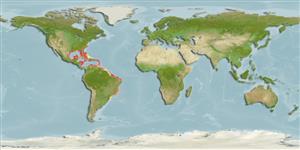>
Holocentriformes (Squirrelfishes, soldierfishes) >
Holocentridae (Squirrelfishes, soldierfishes) > Holocentrinae
Etymology: Sargocentron: Greek, sargos = sargus + Greek, kentron = sting (Ref. 45335).
Environment: milieu / climate zone / depth range / distribution range
Ecologia
marinhas associadas(os) a recifes; intervalo de profundidade 33 - 110 m (Ref. 35505), usually ? - 82 m (Ref. 37108). Tropical
Western Atlantic: South Carolina (USA), Bermuda, Bahamas, northeastern Gulf of Mexico to Lesser Antilles (Ref. 7251), and southern Brazil (Ref. 47377).
Tamanho / Peso / Idade
Maturity: Lm ? range ? - ? cm
Max length : 13.0 cm SL macho/indeterminado; (Ref. 47377); common length : 13.0 cm TL macho/indeterminado; (Ref. 7251)
Espinhos dorsais (total) : 11; Raios dorsais (total) : 11 - 12; Espinhos anais: 4; Raios anais : 8. Usually ones small black spot present on tip of membrane between 1st and 2nd dorsal spines; nasal without spine (Ref. 13608). Snout spinules small, scales asymmetrical. Ridges on lower half of opercle numerous. Head and body salmon red with six very distinct white stripes (Ref. 37108).
Known from offshore , deep waters, with adults trawled between 33-110 m (Ref. 37108). Intertidal observations were also reported (Ref. 49162).
Ciclo de vida ou comportamento de acasalamento
Maturities | Reprodução | Spawnings | Egg(s) | Fecundities | Larvas
Smith-Vaniz, W.F., B.B. Collette and B.E. Luckhurst, 1999. Fishes of Bermuda: history, zoogeography, annotated checklist, and identification keys. American Society of Ichthyologists and Herpetologists Special Publication No. 4. 424 p. (Ref. 35505)
Status na Lista Vermelha da UICN (Ref. 130435)
Ameaça para os humanos
Harmless
Uso pelos humanos
Ferramentas
Relatórios especiais
Baixar XML
Fontes da internet
Estimates based on models
Preferred temperature (Ref.
123201): 19.5 - 27.4, mean 24.7 °C (based on 117 cells).
Índice de diversidade filogenética (Ref.
82804): PD
50 = 0.5000 [Uniqueness, from 0.5 = low to 2.0 = high].
Bayesian length-weight: a=0.01622 (0.00774 - 0.03400), b=2.97 (2.80 - 3.14), in cm total length, based on LWR estimates for this Genus-body shape (Ref.
93245).
Nível Trófico (Ref.
69278): 3.5 ±0.5 se; based on size and trophs of closest relatives
Resiliência (Ref.
120179): Elevada, tempo mínimo de duplicação da população menor que 15 meses (Preliminary K or Fecundity.).
Fishing Vulnerability (Ref.
59153): Low vulnerability (10 of 100).
Nutrients (Ref.
124155): Calcium = 83.2 [32.5, 335.8] mg/100g; Iron = 0.626 [0.249, 1.979] mg/100g; Protein = 18.4 [17.2, 19.6] %; Omega3 = 0.176 [0.074, 0.408] g/100g; Selenium = 37.6 [21.3, 74.7] μg/100g; VitaminA = 85.4 [31.9, 240.2] μg/100g; Zinc = 2.29 [0.95, 4.34] mg/100g (wet weight);
